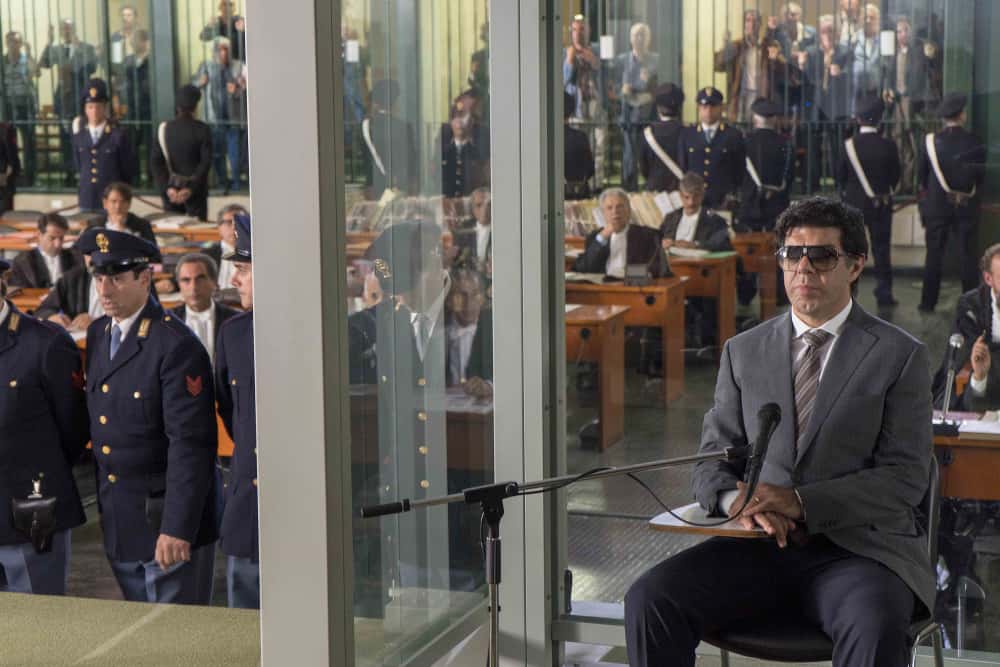The fourth holiday of Nowe Horyzonty started with Zulawski’s first film made in France, L’important c’est d’aimer (1975). It will be covered in an upcoming Zulawski post.
The next movie was by a true veteran, Marco Bellocchio. He is certainly not a favourite of mine, even if I like his debut, Fists in the Pocket (I Pugni in Tasca 1965). Who doesn’t? Then I lost interest in him until I stumbled on Vincere (2009), thanks to rave reviews in France. Since his latest film, The Traitor (Il traditore), got some recognition at Cannes, I decided to see this story about Tommaso Buscetta. He was a mafia guy who collaborated with a judge as an informant against Cosa Nostra. The film clocks in at 145 minutes, which makes it quite challenging. Not because it is slow, since it isn’t, but because it feels so generic.

It’s not only the feeling of déjà vu that’s the problem, but also the narration. Bellochio feels obligated to throw in titles continually, telling us where we are in time and space. They were actually more frequent than in an average episode of Law & Order. If I was irritated by Ildikó Enyedi‘s use of titles, that was nothing compared to this. On a technical level, it is competent in every department, albeit a bit obvious, like the cinematography that conveys the darkness of the main character. The whole thing would probably work better as a miniseries.
The Traitor

Director: Marco Bellocchio
Date Created: 2025-09-16 20:27
1.9
Pros
- Competent
Cons
- Boring
Holiday
Next up was the winner of last year’s Nowe Horyzonty competition. Holiday (2018) by Isabella Eklöf. The director, who also co-wrote the film with Johanne Algren, is probably most well-known for the screenplay of Border (Gräns 2018), which she penned with director Ali Abassi and the author of the source novel John Ajvide Lindqvist.
Eklöf now resides in Denmark, and the film is a Danish production. Sascha is basically the trophy wife of mobster Michael, a man prone to using violence when he doesn’t get his way. During a visit to the Turkish holiday resort Bodrum, she runs into Thomas, a Dutch guy who is selling yachts for a living. She starts flirting with him in a light, playful way. Thus, we supposedly have a love triangle, or do we?
According to the director, Johanne Algren lived the kind of life that Sascha does in the film. In fact, some scenes depict exactly what she experienced during her years as a trophy wife. Being a self-professed feminist, Eklöf doesn’t go for the obvious or tries to manipulate the viewer into sympathising with her protagonist. In fact, I didn’t sympathise with anyone while watching the film, and I mean that as a statement on the writing, not as a critique.
The situations depicted are played for clarity, rather than an attempt to achieve cheap effects. We don’t really get to know Sascha all that well, and she doesn’t express what she thinks in words. A fact that led to a rather animous question during the Q&A, which the director answered in a very straightforward fashion, pointing out that expressing opinions in Sascha’s situation might actually be quite dangerous.
My expectations of this film were not that high (it is non-Hungarian, after all). In some ways, my prejudices were vindicated, notably when it came to the writing and the bold choices that the writers went for. As a piece of cinema, I would call the cinematography unobtrusive, and there’s hardly an image that has stuck in my mind. It feels like the main asset is the body of Victoria Carmen Sonne.
That goes for the character of Sascha as well, since our knowledge of her is only skin deep. On the other hand, that is all she needs to control any situation, which she routinely does nimbly. One could see an affinity between Isabella Eklöf and her creation. They may not use all the conceivably available tools, but they know exactly how to use the ones that they choose to apply. The fact that the film has elicited some hostile reactions from some critics is a sign of its success and the director’s unwillingness to compromise.
Holiday

Director: Isabella Eklöf
Date Created: 2018-01-21 02:13
Pros
- A straightforward approach to a sensitive subject
- Victoria Carmen Sonne in the leading role
Cons
- Cinematography is quite flat

